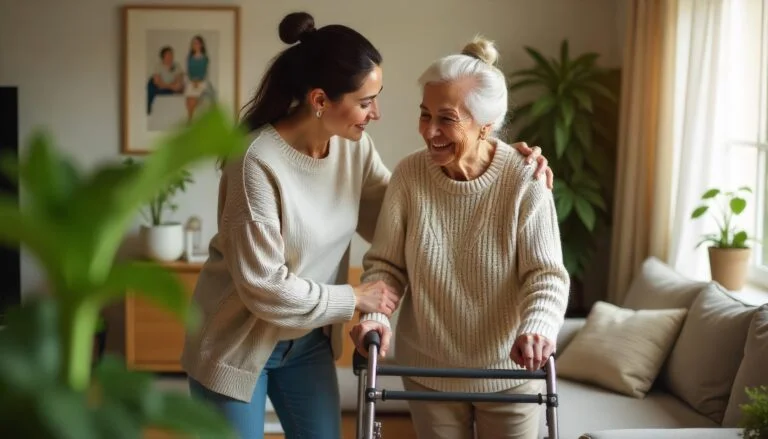
Table of Content
When providing care to a senior loved one, attention often focuses on physical needs. However, emotional wellbeing plays an equally vital role in the overall quality of life for care recipients. Emotional validation is a crucial practice that fosters trust, enhances communication, and boosts mental health for your loved one.
Emotional Validation Explained
At its core, emotional validation is the process of acknowledging and accepting someone’s emotions without judgment. It involves recognizing your loved one’s feelings as valid, even if you don’t necessarily agree with the reasons behind them. By practicing empathy and active listening, you can help your loved one feel understood, respected, and valued.
For instance, if your loved one shares feelings of frustration, instead of dismissing or minimizing his or her emotions by saying “Don’t worry, it’s not a big deal,” you can validate them by responding with “I can see why that would feel frustrating—let me know how I can support you.”
Home care service agencies can be a great boon to seniors. With the help of the caregivers at Assisting Hands Home Care, your aging loved one can lead a happier and healthier life. Our caregivers encourage seniors to eat nutritious foods, exercise and socialize regularly, and focus on other lifestyle factors that increase life expectancy.
Why Emotional Validation Is Important for Care Recipients
- Enhances trust and communication
When care recipients feel their emotions are understood, it builds trust between them and their caregivers. Validating their feelings fosters open communication, making it easier for them to express both their emotional and physical needs. Trust becomes the foundation of effective care, allowing you to respond more effectively to your loved one’s wellbeing.
For example, if your loved one feels safe communicating his or her sadness or anxiety, he or she may be more likely to share these feelings early on, reducing the risk of emotional challenges going unnoticed.
- Boosts mental health and emotional resilience
Many care recipients, especially those with chronic illnesses, disabilities, or aging-related challenges, may feel vulnerable or powerless. Ignored or dismissed emotions can lead to feelings of isolation, anxiety, or depression. Emotional validation combats these effects by instilling a sense of belonging and self-worth.
By acknowledging and holding space for your loved one’s feelings, you can empower him or her to process emotions in a healthy way, building emotional resilience over time.
- Strengthens social connections
Caregiving often means spending extended time with someone in a very personal context. Emotional validation enriches this relationship by building a deeper connection between caregiver and care recipient. These strong bonds offer emotional comfort and promote a sense of stability, particularly for individuals navigating life changes, such as illness or aging.
When your loved one feels emotionally supported, it may enhance his or her interactions with others as well, fostering better communication with friends and family members.
- Empowers independence and self-acceptance
A crucial but often overlooked benefit of emotional validation is that it helps care recipients accept their emotions and develop confidence in handling them. This emotional independence allows seniors to feel less burdened by their emotional challenges, reducing their reliance on external reassurance.
By encouraging your loved one to acknowledge and value his or her feelings, you enable your loved one to regain or maintain a sense of self-control, an essential factor for increasing autonomy.
Living independently is important for seniors who want to maintain a high quality of life. For some, this simply means receiving help with tasks that have become more challenging to manage over time. Even when families have the best intentions, they may not have the time to provide the care their elderly loved ones need and deserve. If your loved one needs help for a few hours a day or a few days a week, reach out to Assisting Hands Home Care, a trusted provider of respite care Richmond seniors can depend on.
Practical Strategies for Providing Emotional Validation
- Practice active listening
Set aside distractions and focus entirely on your loved one as he or she shares his or her feelings. Reflect back what you hear using phrases like “It sounds like you’re feeling…” to show empathy and affirm that your loved one’s emotions matter.
- Acknowledge without judgment
Avoid phrases that dismiss or criticize emotions, like “You’re overreacting.” Instead, use language that normalizes your loved one’s experience, such as “It’s okay to feel this way—it makes sense given what you’re facing.”
- Ask open-ended questions
Encourage your loved one to discuss his or her emotions further by saying “Can you tell me more about how you’re feeling?” Open-ended questions can empower your loved one to explore and articulate his or her emotions, supporting emotional clarity.
- Be genuine and patient
Some emotions may be challenging to witness or understand, but staying present and offering genuine support is critical. Rather than trying to “fix” the problem, focus on being a supportive presence.
If you have a senior loved one who needs help maintaining a high quality of life while aging in place, reach out to Assisting Hands Home Care, a leading provider of elder care Henrico families can trust. Our caregivers help seniors focus on healthy lifestyle habits such as eating nutritious foods, exercising regularly, and maintaining strong social ties, and we offer mentally stimulating activities that can boost cognitive health and delay the onset of dementia. Schedule a free in-home consultation by giving us a call today.
